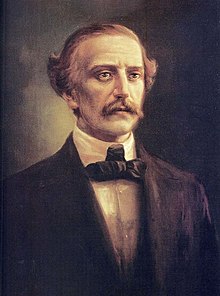
Back خوان بابلو دوارتي Arabic خوان بابلو دوارتى ARZ হুয়ান পাবলো দুয়ার্তে Bengali/Bangla Juan Pablo Duarte Catalan Juan Pablo Duarte German Juan Pablo Duarte Spanish Juan Pablo Duarte EU خوان پابلو دوآرته FA Juan Pablo Duarte French Juan Pablo Duarte GA
This article may be too long to read and navigate comfortably. When this tag was added, its readable prose size was 12804 words. (May 2024) |
Juan Pablo Duarte | |
|---|---|
 Oil portrait of Juan Pablo Duarte by Dominican artist Abelardo Rodríguez Urdaneta. | |
| Born | January 26, 1813 |
| Died | July 15, 1876 (aged 63) |
| Resting place | Altar de la Patria |
| Nationality | Dominican |
| Occupations |
|
| Years active | 1833–1876 |
| Organization | La Trinitaria |
| Title | Father of the Nation |
| Political party | Central Government Junta |
| Parents |
|
| Relatives | Vicente Celestino (brother) Maria Josefa (sister) |
| Awards | National hero |
| Honours | Order of Merit of Duarte, Sánchez and Mella |
| Military career | |
| Allegiance | |
| Years of service | 1834–1876 |
| Rank | Brigadier General
|
| Battles / wars | Dominican War of Independence Dominican Restoration War |
| Signature | |
 | |
Juan Pablo Duarte y Díez (January 26, 1813 – July 15, 1876)[1] was a Dominican military leader, writer, activist, and nationalist politician who was the foremost of the Founding Fathers of the Dominican Republic and bears the title of Father of the Nation. As one of the most celebrated figures in Dominican history, Duarte is considered a folk hero and revolutionary visionary in the modern Dominican Republic, who along with military generals Ramón Matías Mella and Francisco del Rosario Sánchez, organized and promoted La Trinitaria, a secret society that eventually led to the Dominican revolt and independence from Haitian rule in 1844 and the start of the Dominican War of Independence.
Born into a middle-upper class family in 1813, his childhood was engulfed in several administrative changes in Santo Domingo. He was a toddler during the years of España Boba, which came to an end with the proclamation of José Núñez de Cáceres, who declared the first independence of Santo Domingo in 1821. Not long after this, Haitian president Jean-Pierre Boyer invaded the country, establishing a military occupation that would last for 22 years. This period was ravaged with economic and social repression. Duarte's desire for knowledge and his dreams of improvement led him to Europe, where he strengthened his liberal ideas. These ideas formulated the outline for establishing an independent Dominican state. Upon returning, he voluntarily dedicated himself to teaching in the streets, improvising a school in his father's business, determined that the people of his era assimilate his ideals of revolutionary enlightenment. In 1834, Duarte became an officer in the Haitian National Guard, rising to the rank of colonel.
In 1843 he participated in the "Reformist Revolution" against Boyer in favor of Charles Rivière-Hérard.[2][3] However, the new president issued a manhunt for Duarte, forcing him to flee the island. In the meantime, two of his most prominent followers, Francisco del Rosario Sánchez and Matías Ramón Mella, continued the fight for independence, which had finally been achieved on February 27, 1844. Having returned in time to take part in the Dominican War of Independence, he was immediately acquired into the new government. As a member of the Central Governing Board, he originally rejected a proposal to take the presidency by his followers.[4] On June 9, 1844, he launched the 18 Dominican Brumaire against said institution that would dismiss most of its members, becoming, after that, the first inspector general of the national troops. He would accept being proclaimed president by his supporters in the Cibao, which would earn him being declared "a traitor and unfaithful to the Homeland" and being expelled from the country by the then government presided over by the landowner Pedro Santana.
Duarte lived in exile in Venezuela due to the political and military conflicts that existed in the Dominican Republic, which constituted a serious danger to his life. In Venezuela, he was received and welcomed making this land his second home. He maintained a relatively low profile in the Venezuelan jungle, moving from city to city, though he gradually emerged from recluse by the early 1860s. However, he returned to Caracas in 1862 to raise funds and return to the Dominican Republic upon learning of the annexation to Spain. By the time of the outbreak of the Dominican Restoration War, he returned to his homeland but the restoring Government of Dominican President José Antonio Salcedo asked him to return to Venezuela on a diplomatic mission as Plenipotentiary Minister to request the support of the Government of Venezuelan President Juan Crisóstomo Falcón to the cause of the restoration of Dominican Independence. Duarte, although not very much in agreement with the mission, returned to Caracas and fulfilled as much as possible. After completing his diplomatic mission, he stayed to live in this country where he died in Caracas on July 15, 1876.
- ^ "Juan Pablo Duarte Biography". Biography.com. 2010. Archived from the original on 2010-09-11. Retrieved 2010-07-26.
- ^ "Biografia de Juan Pablo Duarte". Instituto Duartiano (in European Spanish). 6 July 2016. Archived from the original on 21 January 2019. Retrieved 21 January 2019.
- ^ Jesús, Elizahenna Del (4 October 2016). "Biografía de Juan Pablo Duarte". Plan LEA (in European Spanish). Retrieved 21 January 2019.
- ^ "Biografia de Juan Pablo Duarte". Archived from the original on 2019-01-21.